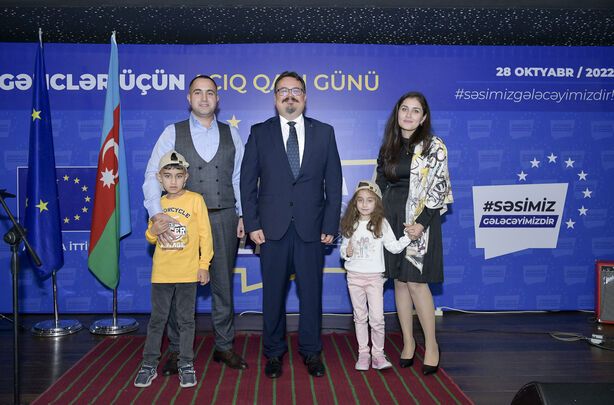PAPA DIPLOMA

As a beneficiary and ‘Papa’ diploma holder under the EU-funded project School for dads – a transformation of responsible fatherhood, implemented jointly by UN Women and UN Population Fund (UNFPA), Ravan Jabrayilov, nevertheless, beleives that neither fatherhood lessons nor exams are set to be over.
What kind of dad am I?
Leyla has a vision of her dad as the best father on planet Earth. Nobody, even her mother could be better at cooking scrambled eggs. Her dad takes her for a walk and does her shopping for her. Although she has her bed, she prefers to fall asleep huddling on his lap or in his arms, diving into the world of fairy tales that he would read to her. For Ziyad, his dad is also an ideal father, his role model to follow to become a military serviceman once he is fully-grown. Aytan is also happy with Ravan, both in his capacity as her spouse and the father of their children. Without his support in bringing up their children, it would be unlikely that she could continue as a secondary school teacher when the family moved from Sabirabad, a small regional town, to Baku, the capital and the country’s only metropolis.
Ravan also thought he was a good father. That belief was however challenged when he came across a Papa School ad on social media asking a question that had not dawned upon him before: “I wonder what kind of dad I am? What is it like to be a good dad?”
Ravan consulted with Aytan out of habit, telling her he was willing to sign up.
Soon afterward the entire family of four was attending school. However, despite Aytan, Leyla, and Ziyad hurrying to school in the morning, Ravan was running to his classes after working hours, in the evening, changing his military uniform to civilian clothes.
He shared with Aytan what he had gained from every session.
The most powerful lesson learned
“When I was attending the Papa School, I was preoccupied with one question. We all consider ourselves the best fathers. Sometimes we think that financial support for our kids qualifies as the most important criterion for being a good dad. That is not the case though. Our time and energy are the most precious resources we can give to our kids. I always tried to share some time with my kids, but the Papa School encouraged me to spend more time with them, at least to try to match my spouse in nurturing and raising them.
Discussions on diverse topics were the most intrinsic part of the Papa School. Having listened to different thoughts, you realise that not all that you think can put you on the right track. Before I started attending the Papa School, I held firm to stereotypical thinking about the choice of profession for a girl, thinking that my daughter was supposed to become either a doctor or a teacher. It looked as if I would make her happier had I guided her in line with my way of thinking. I changed my mind altogether. I am not going to get in Leyla’s way of choosing her profession in the future. Maybe she could shine in the area which I did not appreciate as a ‘women’s job,’ and do something very useful for humanity.
Once at the Papa School, I felt shocked upon witnessing an event that changed my perspective on life altogether. A family were attending our class – a father, a mother, and their child who was seriously ill. Nevertheless, the family were happy, valuing every episode of their life together, thereby being able to support each other. Back home after every session, I kept on talking with Aytan about that family. That is how we have woken up to the fact that family is our greatest asset, and we have to care about and preserve it. This requires working on yourself on a daily basis.
Neither lessons nor exams and dreams are set to come to an end…
Figuratively speaking, I got a diploma from the Papa School – a welcome achievement for me personally, and Aytan. She cherishes the Papa School related items – a bag and a mug given to me, even our session schedule – like the apple of her eye.
Although I graduated from the Papa School courses, this year I enrolled in them once more. I do not have anything to hide – I appreciate the school environment and honor the people I got to know there. Besides, the classes provided a response to the questions that concerned me. Moreover, I could share with Aytan what I learn.
Aytan and I grew up in a province. We fell in love with each other, married, and started our family. Despite residing in Baku, we travel to Sabirabad [a rural administrative district covering a dry plainland west of Baku.] every weekend. Aytan’s mother and sisters live there. We all love the countryside – there I taught my kids how to catch fish.
Meanwhile, I suppose that despite all the natural and man-made beauties, rural areas are not immune to shortcomings too. Rural families often have to deal with the consequences of uneven distribution of domestic and parental roles and responsibilities between spouses, leading to domestic clashes and making themselves ‘captive’ to stereotypical thinking. Aytan and I wish the Papa School institutions had been active in rural areas too. Sabirabad could be a suitable destination. I hope that we will live up to the day of the opening of a Papa School in Sabirabad.”